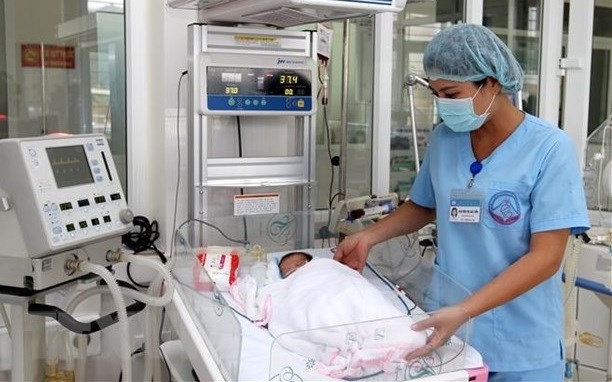
Prenatal, new-born screening improves population health
Latest
 |
| New-born screening at the National Hospital of Obstetrics and Gynecology. (Source: VNA) |
On average, each year, Vietnam has about 1.5 million babies born, of whom about 40,000, unfortunately, suffer from genetic diseases, and birth defects.
Prenatal screening allows early detection of many congenital defects and chromosomal abnormalities such as Down syndrome and Thalassemia.
Each year, 1,400-1,800 children are born with Down syndrome, while about 2,200 others suffer Thalassemia.
According to Doctor Le Minh Trac, Director of the Centre for Infant Care and Treatment under the National Hospital of Obstetrics and Gynecology, prenatal and neonatal malformation screening is extremely necessary for early detection, intervention, and treatment of diseases, abnormities, and metabolic and genetic disorders right in the fetal and neonatal periods.
Early detection and treatment will lead to high treatment efficiency, enabling children to develop completely normally, he said.
Doctor Trac advised pregnant women to get examinations at least three times during their pregnancy and receive screenings that reduce the impact on children.
Data shows that the investment efficiency of newborn screening is 5.7, which means that for every 1 VND spent on newborn screening, the society will save 5.7 VND in the cost of nurturing and caring for children with disabilities.
For example, the average cost of Thalassemia treatment for a patient with severe Thalassemia from birth to 30 years old is estimated at about 3 billion VND (127,253 USD). According to incomplete statistics, Vietnam currently has about 12 million people carrying the Thalassemia gene and over 20,000 severe cases requiring lifelong treatment. Every year, the whole country needs more than 2 trillion VND for all patients to receive minimum treatment and needs about 500,000 units of blood.
Therefore, the implementation of pre-marital counseling activities and health check-ups, and prenatal and newborn screening will reduce the society's cost for the treatment of these cases. At the same time, it enables early interventions to minimize malformations from the prenatal period, helping children with normal childbirth and avoid severe physical and mental consequences, thereby reducing the number of people with disabilities in the community, and contributing to improving the quality of health and awareness in the population.













